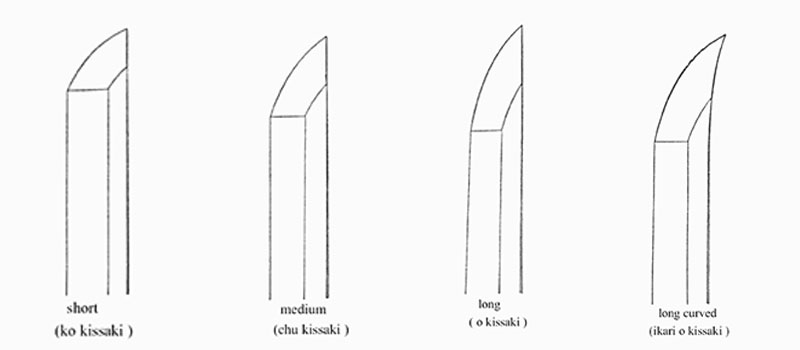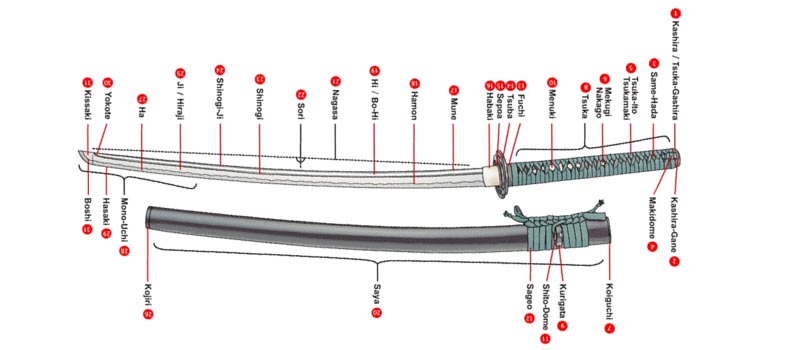Hacuharu katana made of AISI 1095 carbon steel, real Hamon
Code: K-748


Related products
Product detailed description
Katana Hacuharu carbon steel blade AISI 1095
very well made replica of Japanese sword
Forged steel blade AISI 1095 of the highest quality. Steel in Maru monocomposite configuration - differentially hardened. AISI 1095 carbon steel is very strong and holds its sharpness very well. The blade without the bo-hi groove has been hand polished with hazuya stone in the final stage - thus achieving an almost razor sharp edge and a mirror-like shine.
The distinctive real hamon is created according to ancient traditional methods based on the many years of experience of the master blacksmith. Everything on this sword is individually made, including the saya and habaki, the highest quality components are used, including the top quality lacquer on the saya. This is a very well made replica of a samurai sword, which is suitable for sake tests and can be disassembled into individual parts. This blade has been tried and tested to remove everything in its path ! Sori (blade curvature) is specially designed to achieve the finest and cleanest cuts possible. All of this combined with the choice of a traditional Koshirae forged ensures that you get the best in terms of appearance and functionality. The AISI 1095 carbon steel has an impressive hardness of HRC 58 - the perfect combination of this hardness is underlined by the curvature of the Sori blade, which makes it easy to cut through tatami, straw mats or bamboo for tameshigiri. The full tang construction of this katana greatly increases the sword's power. The blade is of the shinogi-zukuri type, this type of blade has been produced since the 10th century AD. The tip of the chu kissaki sword with a true Diamond-Shaped Yokote, which is very well defined by the hamon running the entire length through the Boshi. Yokote is very important for the structural integrity of the sword tip. It helps to absorb shock, disperses force and contributes to the stability and strength of the sword during the so-called follow-through. This katana (samurai sword) is suitable for practical use, the company Dellinger however, the company disclaims any liability for injury or damage resulting from use. Keep out of reach of children ! Any tampering with the samurai sword is your own responsibility. Don't forget you have a deadly weapon in your hands!
Thekatana 刀 is a type of samurai sword whose origin dates back to around the 15th century AD. The katana has a curved blade, just like a sabre. The hilt (tsuka) is oval in cross-section, topped with a steel fighting guard (tsuba). The length of the katana blade starts from about 60 cm. The samurai carried a katana tucked behind his kaku-obi belt, blade up, along with a short sword Wakizashiso that he could respond to a sudden enemy attack directly from the scabbard. The pair of katana and wakizashi swords was called the daiō and was the symbol of the samurai class. The two-sword daiō set became standard equipment for samurai. The long katana was used for fighting in open spaces, while the short wakizashi or tantō was used for fighting in confined spaces or for ritual suicide called seppuce.
Tip shapes (kissaki)

The katana can be disassembled and any part can be replaced according to your wishes - we recommend to buy a set of tools and accessories

Technical description:
| Total length of the katana: |
103 cm |
| Blade length: |
71 cm |
| Handle length: | 27 cm |
| Blade material: |
AISI 1095 Carbon Steel |
| Strength / height of the blade at habaki: | 0.7 / 3.2 cm |
| Blade hardness: | 55-58 HRC |
| Hamon: | the real Choji |
| The blade: | full tang, sharp, secured with 2 pins (mekugi) |
| Saya: | hardwood with Sageo wrap |
| Saya length: | 76 cm |
| Tsuba (patronage): | steel |
| Tsuka (handle): | wooden core, synthetic ITO wrap |
How to take care of a katana and what not to do with it....
in general, all activities except for traditional chopping test techniques, which involve chopping into special mats
![]() Cutting branches, trees and bushes: for this activity people have developed other tools such as axes or machetes.
Cutting branches, trees and bushes: for this activity people have developed other tools such as axes or machetes.
![]() Chopping, or swordplay with another sword: destructive damage to the blade of a samurai sword - samurai avoided any direct contact with the enemy to avoid damaging the blade. The repair was long and expensive.
Chopping, or swordplay with another sword: destructive damage to the blade of a samurai sword - samurai avoided any direct contact with the enemy to avoid damaging the blade. The repair was long and expensive.
![]() Nnever wear a sharp samurai sword with the blade exposed in public: Always keep your sword in the Saye (scabbard). In Germany and other EU countries, this is even an obligation prescribed by gun law.
Nnever wear a sharp samurai sword with the blade exposed in public: Always keep your sword in the Saye (scabbard). In Germany and other EU countries, this is even an obligation prescribed by gun law.
![]() Never insert a dirty blade into the sayi: If you are performing chopping tests on fruit, clean and preserve the blade immediately after chopping, otherwise the blade will rust and oxidize.
Never insert a dirty blade into the sayi: If you are performing chopping tests on fruit, clean and preserve the blade immediately after chopping, otherwise the blade will rust and oxidize.
![]() Never leave your sword in a damp place such as a porch, shed, cellar or conservatory: This is certainly not the treatment this traditional weapon deserves. Always clean the blade after use, brush with oil and store the sword in a dry place.
Never leave your sword in a damp place such as a porch, shed, cellar or conservatory: This is certainly not the treatment this traditional weapon deserves. Always clean the blade after use, brush with oil and store the sword in a dry place.
Dellinger guarantee: Products supplied by Dellinger come with a 100% satisfaction guarantee or a risk-free money back guarantee. We guarantee an excellent product that will give you the best service and is proven by many satisfied customers. Each piece is wrapped in luxury packaging and can be a wise gift solution for a birthday, wedding or Christmas. Every product that Dellinger offers is carefully inspected. We bring you a lifetime warranty against any hidden defects. If you have any questions - our team is fully at your disposal and will try to help you in any (even unpleasant) situation.
















